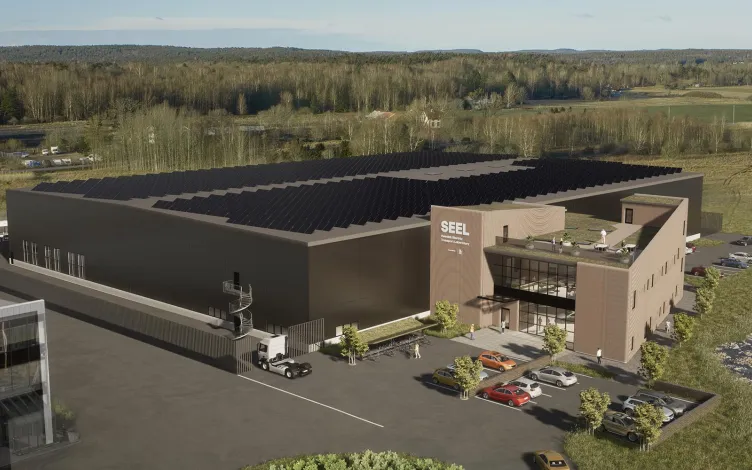Contact person
Henrik Svenningstorp
Chef inom strategisk forskning och affärsutveckling
Contact Henrik
A unique opportunity to develop new electromobility products and services has opened up. In September 2023, three new test centers for electric vehicles and components were inaugurated within the initiative SEEL, Swedish Electric Transport Laboratory. The goal is clear: The testbed is to comprise one of the few open meeting places for collaboration and innovation in Europe.
“It's been a crazy time to make a billion dollar investment like this. But we are extremely proud and happy to now be able to open the doors to three new test environments for electromobility. And the interest, well, that’s grown more than the construction index and timber prices,” says Henrik Svenningstorp.
Henrik Svenningstorp is CEO of SEEL,owned by RISE and Chalmers University of Technology and which in 2023 will begin testing vehicles and components for electromobility on a full scale in Gothenburg, Borås and Nykvarn.
“We’re not trying to be the best at making batteries or electric motors, we’re simply trying to be the best at measuring them. In Säve, we have facilities covering some 15,000 square metres with essentially everything you need to test whatever needs to be tested within electromobility: batteries, shafts, vehicles, electrical components, noise and vibration, charging systems… The facility in Nykvarn is a little smaller, with a focus on heavy vehicles. This is where, for example, we have the most powerful equipment for testing electric motor shafts. The only thing we can’t do in Gothenburg or Nykvarn is safety-critical and destructive testing. That we do in Borås.”
"The lab for safety-critical testing in Borås is a world-leading test environment with the greatest possible concern for the environment. All tests take place in a controllable and fully repeatable indoor environment, and thanks to a state-of-the-art treatment plant, both flue gases and extinguishing water are taken care of, which means the highest possible environmental friendliness when testing batteries", says Michael Rahm, department manager for Fire and Safety at RISE.
The fume treatment plant can handle 170,000 cubic metres of smoke an hour. This makes it possible to incinerate an entire passenger car in an orderly fashion, taking care of all the fumes and measuring their composition. Since the facility is run by RISE, certification will be possible from the outset. The long-term ambition is to accumulate extensive technical expertise that will enable the testbed to offer virtual testing as well.
We want to be a neutral meeting place conducive to new collaborations
“Our goal is clear: We want to be a neutral meeting place conducive to new collaborations, whether between large and small companies or industry, academia and institutes. Europe has relatively few open and accessible testing facilities of this size. And we’re well aware that large companies appreciate the innovation boost they can gain from collaborating with smaller, innovative companies. Similarly, smaller companies may need to test their ideas in the environments in which major players are found while protecting their future patents,” Svenningstorp explains.
In collaboration with RISE, it will be possible to support small companies seeking funding for their first major investments. SEEL will be judged by its owners on how well it succeeds in encouraging collaboration. Four major industrial companies are involved in the project as guaranteed customers, and their testing needs are extensive. Parallel to this, there is room for other companies of different sizes, and should space prove to be limited as time goes by, there are ambitions to expand.
“There’s a great deal going on right now. Since receiving our EU approval in 2019, interest has only increased. We’re also busy on several fronts. In Säve, parts of the laboratory are even prepared for hydrogen and fuel cells, a possible replacement power source for all large vehicles with internal combustion engines currently trafficking the roads that need to transition. We’ve entered into a partnership with the shipping industry and signed an MoU (memorandum of understanding) with several stakeholders.”
Initial contact has been made with the aviation industry. Svenningstorp underlines that while there are major differences between truck and jet engines, the differences between electric motors for different types of transport are smaller.
“In principle, if we can measure rotational speed, torque, current and voltage, then we can test a powertrain regardless of whether it’s for a vehicle, a ship or an aircraft.”
“We’ll also be able to test infrastructure, such as charging stations. For some areas of the recycling industry, our labs may prove necessary when making new products from what is currently treated as waste. The same applies to the energy industry, which is developing vehicle-to-load and vehicle-to-grid – different systems for using electric vehicle batteries for energy storage.”
On top of all this, there is a need to train the workforce for all the battery factories and other operations in the growing electromobility industry. The testbed facilities are designed to enable education and training.
“We are now ready to open our three sites with grand openings in September. These are exciting times,” Svenningstorp ends.
Many stakeholders are currently expressing great interest in testing solutions for different aspects of electromobility.
Founded on the combined expertise of RISE and Chalmers University of Technology and with four guaranteed major industrial customers, the testbed now has the capacity to help small, medium and large organisations with both small and large-scale electromobility innovation projects.
The testbed can help customers with all types of electric vehicle testing activities.

Contact person
Chef inom strategisk forskning och affärsutveckling
Contact Henrik